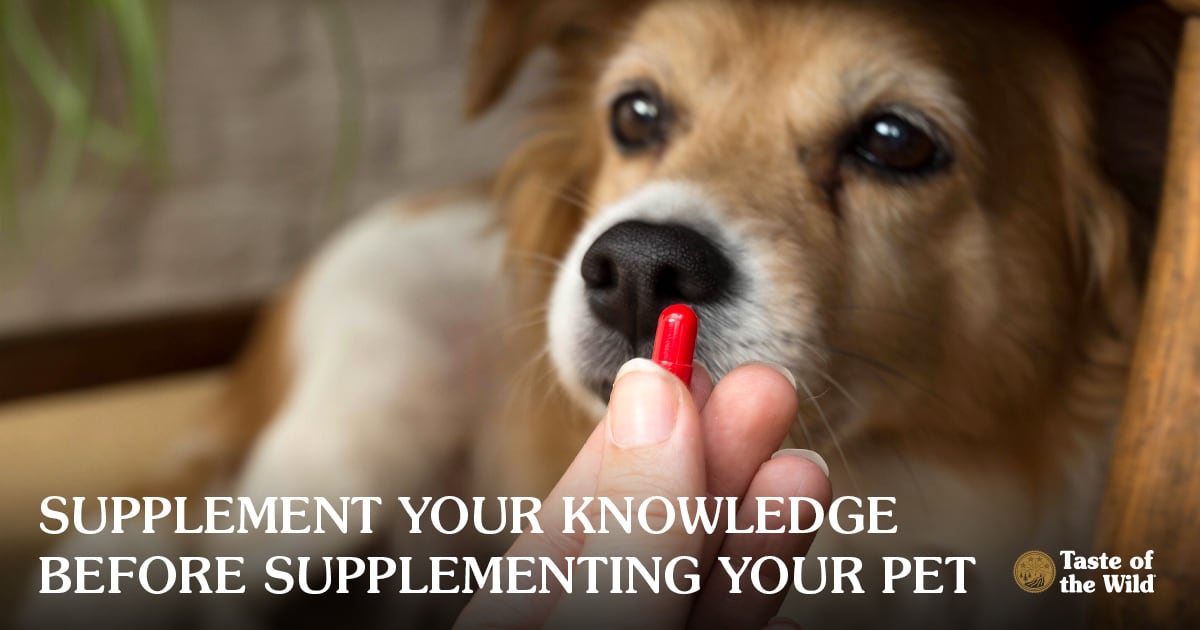
These days, people are all about health, wellness and prevention. So much so, in fact, that consumers in the United States will spend an estimated $32 billion on vitamin and nutritional supplements in 2019.
You may have wondered if your dog or cat could benefit from supplements, too. Many pet owners have already decided: About a third of U.S. households with dogs and one-fifth of those with cats use pet supplements, according to the research company Packaged Facts.
The most commonly purchased supplements for pets, according to a survey of pet owners, include those for joint health, heart health, skin and coat health, digestive health/hairball prevention and omega fatty acid supplements. More recently, there’s been increasing pet owner interest in CBD (cannabidiol) for pets, with purported benefits ranging from pain management to anxiety relief.
But here’s the thing: Some supplements may be helpful, others may be harmful and some simply aren’t necessary. Here’s what you should know.
“Natural” or “organic” doesn’t always mean safe
While there’s a general perception that any supplement with these words on the label should be harmless, that’s just not the case. Some supplements can be dangerous to people and pets, even leading to death. Supplements have landed both humans and pets in the emergency room, and Consumer Reports even published their “Dirty Dozen” list of human supplements that are best avoided.
Because pets may metabolize supplements differently than people, those products deemed “safe” for humans may not be for pets. And you should never assume that a human dose is the same amount a pet should receive. Supplements may also cause interactions with the medications the pet is currently taking.
Will vitamin supplements help your pet?
“If your pet is eating a complete and balanced commercially available pet food, supplements are not recommended unless specifically prescribed by your veterinarian,” according to the American College of Veterinary Nutrition via AVMA.org. Adding vitamins and minerals to such a diet could lead to unsafe or toxic levels in your pet.
Often no proof of efficacy
Supplements are considered a dietary “food,” rather than a drug. As such, they aren’t required to prove safety, efficacy or quality before being marketed. They also don’t need to pass the rigorous Food and Drug Administration (FDA) testing usually required for drugs. Very few reputable studies have been done to verify the efficacy of supplements designed for humans, let alone those created for pets.
What you see isn’t always what you get
There is very little oversight on the manufacturing of supplements, so you can’t be assured that ingredients or amounts listed on the label are actually what’s in the bottle.
Here’s an example from the human supplement world that shows the willy-nilly state of supplement quality assurance. Recently, the New York State attorney general’s office investigated top-selling herbal supplements sold at four national retailers: GNC, Target, Walgreen’s and Walmart. Test results showed four out of five products didn’t contain the herbs listed on the labels and often contained inexpensive fillers like houseplants and powdered rice and even ingredients that could be dangerous to people with allergies.
The attorney general’s office charged the retailers with selling fraudulent and potentially dangerous supplements and asked the retailers to remove the products from their shelves.
Follow your veterinarian’s advice
The bottom line is that while there are supplements that may be helpful to your pet, especially if he or she has conditions such as osteoarthritis, heart disease or anxiety, you should always consult your veterinarian before giving anything to your pet. Your veterinarian can recommend a product, a brand he or she trusts, as well as the proper dose for your pet.
The information in this blog has been developed with our veterinarian and is designed to help educate pet parents. If you have questions or concerns about your pet's health or nutrition, please talk with your veterinarian.
